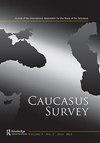Kalmyk Identity in Historical Perspective
IF 0.5
Q3 AREA STUDIES
引用次数: 1
Abstract
The Kalmyks have lived in southwest Russia for about four centuries. Whilst cultural assimilation with neighbouring peoples has been an ongoing process since the Kalmyks first settled in the lower Volga from 1630, the twentieth century, which saw the rise and fall of several political regimes in Russia, was the most dramatic period in the group’s history in that it had a deep impact not only on their social structure, religion, and way of life but also on their identity. Subjected to various political ideologies, not to mention punitive mass deportation to Siberia and Central Asia from 1943 to 1956, the Kalmyks had to constantly negotiate their identity not only with the Tsarist/Soviet/Russian state but also among themselves. Whilst today’s self-narratives of Kalmyk ethnic identity are inextricably linked to the discourse of post-Soviet cultural revival, in order to explain the fluidity and dynamics of Kalmyk identity this paper takes a comprehensive approach to the history of the Kalmyk people since their first settlement on the lower Volga. Ethnic identity and its development are narrated chronologically, taking into account social structure, religion, historiography, and popular concepts to which the Kalmyks have been subjected, and which they have embraced, in the course of their history.历史视野中的卡尔梅克身份
卡尔梅克人在俄罗斯西南部生活了大约四个世纪。虽然自1630年卡尔梅克人首次在伏尔加河下游定居以来,与邻国人民的文化同化一直是一个持续的过程,但20世纪见证了俄罗斯几个政治政权的兴衰,是该群体历史上最戏剧性的时期,因为它不仅对他们的社会结构、宗教、,和生活方式,但也取决于他们的身份。卡尔梅克人受制于各种政治意识形态,更不用说1943年至1956年被惩罚性大规模驱逐到西伯利亚和中亚了,他们不仅要与沙皇/苏联/俄罗斯国家,还要不断地就自己的身份进行谈判。尽管今天关于卡尔梅克民族身份的自述与后苏联文化复兴的话语密不可分,但为了解释卡尔梅克身份的流动性和动态性,本文对卡尔梅克人自首次定居下伏尔加以来的历史进行了全面的研究。民族身份及其发展是按时间顺序叙述的,考虑到社会结构、宗教、史学和卡尔梅克人在其历史过程中所受的流行概念。
本文章由计算机程序翻译,如有差异,请以英文原文为准。
求助全文
约1分钟内获得全文
求助全文
来源期刊

Caucasus Survey
Arts and Humanities-History
CiteScore
1.30
自引率
9.10%
发文量
4
期刊介绍:
Caucasus Survey is a new peer-reviewed, multidisciplinary and independent journal, concerned with the study of the Caucasus – the independent republics of Armenia, Azerbaijan and Georgia, de facto entities in the area and the North Caucasian republics and regions of the Russian Federation. Also covered are issues relating to the Republic of Kalmykia, Crimea, the Cossacks, Nogays, and Caucasian diasporas. Caucasus Survey aims to advance an area studies tradition in the humanities and social sciences about and from the Caucasus, connecting this tradition with core disciplinary concerns in the fields of history, political science, sociology, anthropology, cultural and religious studies, economics, political geography and demography, security, war and peace studies, and social psychology. Research enhancing understanding of the region’s conflicts and relations between the Russian Federation and the Caucasus, internationally and domestically with regard to the North Caucasus, features high in our concerns.
 求助内容:
求助内容: 应助结果提醒方式:
应助结果提醒方式:


